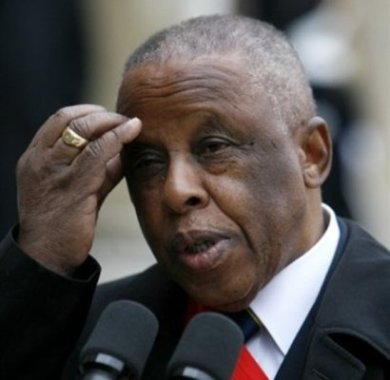S. Sudan peace monitors warn famine could undermine peace efforts
April 26, 2017 (JUBA)- The head of the Joint Monitoring and evaluation commission, a regional appointed body to oversee the implementation of peace agreement which armed and non-armed opposition parties to the conflict have signed in 2015 to end war, has warned that famine in the country could undermine efforts.

“There can be no doubt that we now face a crisis within a crisis. Security is the foundation stone upon which we build economic and social confidence. This foundation stone no longer exists, confidence has evaporated, commerce is seizing up, prices are escalating and as a result we now face a crisis of hunger that is undermining all our efforts to make peace”, said Mogae
He said women in South Sudan face a daily struggle with inflation, never knowing if the money in their pocket will be sufficient to feed their family, adding that Insecurity creates food shortages, which in turn drives inflation that in turn results in hunger.
“A hungry man is an angry man. And angry men do not make peace. Food shortages and increasing hunger are now our immediate problems. Out in the country, beyond the reach of government, the situation is increasingly desperate. Instability and hunger has created a surge of survival-criminality that further exacerbates the problem through stealing, looting and the prevention of free-flowing commerce”, he said.
The top peace monitor pointed out that violence in the country was either carried out with central command or taken on the basis of local situation without necessarily receiving directives from anybody to which the group attaches political allegiance.
“Violence and conflict on this level is either centrally directed or locally orchestrated. I fear it is now time to acknowledge that, across the board, among all armed forces and armed groups, central structures of command and control appear to have broken down. Violence around the country is increasingly based on local decisions taken at local level. Armed groups may declare an allegiance to one leader or another, but they seem no longer to take their instructions from them.”
The briefing was part of monthly activities at which the peace monitoring body presents report to the Board members, including representatives of the Transitional Government of National Unity, South Sudanese Stakeholders, IGAD member states, the UN, the Troika (US, UK, Norway), China, EU and International Partners Forum and Friends of South Sudan.
These reports are also received from the Transitional Government of National Unity (TGoNU), Ceasefire and Transitional Security Arrangements Monitoring Mechanism (CTSAMM), Joint Military Ceasefire Commission (JMCC), Joint Integrated Police (JIP), Strategic Defence and Security Review Board (SDSRB) and the National Constitutional Amendment Committee (NCAC).
Mogae decried the killing of the humanitarian situation, saying it was no longer acceptable to claim the lives of people who are working hard to salvage the situation of those in dire of humanitarian aids.
“Twelve aid workers have been killed in South Sudan so far this year. It is simply deplorable that in 2017 we must still plead with a government for the safety of those who deliver humanitarian relief,” said the former Botswana president.
“I can only repeat that this humanitarian situation is predominantly man-made and the result of violence, conflict and the deliberate denial of access. Men, women and children are suffering and dying of starvation because the leadership at various levels is failing to prevent it,” he further stressed.
Famine in parts of war-torn South Sudan has left 100,000 people on the verge of starvation and almost 5 million people, more than 40% of the country’s population, in need of urgent help, aid agencies say.
(ST)
